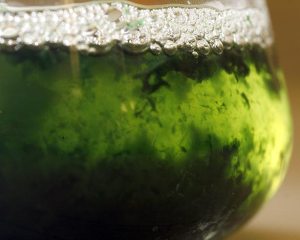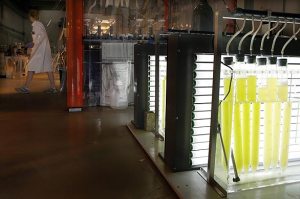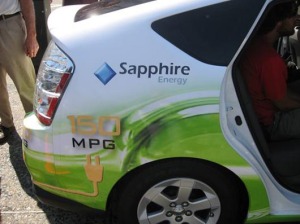The headlines are wreaking of investments in algae – yes that yukky stuff that can actually be very toxic to sea life. Wouldn’t you know, the Swamp Thing is poised to have big value. 
According to an article by ScienceDaily “Algae are tiny biological factories that use photosynthesis to transform carbon dioxide and sunlight into energy so efficiently that they can double their weight several times a day.
As part of the photosynthesis process algae produce oil and can generate 15 times more oil per acre than other plants used for biofuels, such as corn and switchgrass. Algae can grow in salt water, freshwater or even contaminated water, at sea or in ponds, and on land not suitable for food production.”
This oil can be used for gas, diesel, and jet fuels. Algae biofuel is also compatible with existing engines, existing storage, distribution, and delivery infrastructure. However the most important aspect is that algae-based biofuels have a low carbon footprint as they do not require the use of forests or large areas of land for production.
Some other wonderful aspects of algae-based biofuels:
– Algae biofuel is carbon neutral; only emits C02 that it absorbs.
– Algae reproduces very quickly, maximizing biofuel yields.
– Algae biofuel can scale to even possibly replace oil.

The world’s first algae fuel-powered vehicle, dubbed the Algaeus. The plug-in hybrid car, which is a Prius tricked out with a nickel metal hydride battery and a plug, runs on green crude from Sapphire Energy — no modifications to the gasoline engine necessary.
– Algae biofuel is commercially viable on an industrial scale.
– Algae biofuel can become price competitive with oil.
– There are no soil requirements for algae biofuel.
– Algae can be produced locally for food and fuel.
– Algae biofuel does not damage food prices.
– The algae biofuel industry is growing quickly with a bright future.
– Algae yields much more biofuel per acre than other fuels.
– Algae photo-bioreactors require very little land.
– Algal fuels do not impact fresh water resources.
– Algae biofuel can grow in salt water, freshwater or contaminated water.
– Human waste and sewage can be used to grow algae biofuel.
– Algae can be used to filter C02 from coal plants and create biofuel.
– Algae biofuel is more practical than solar power.
– Algae does not compete with food resources like other biofuels.
Pulled from the headlines – look whose investing in algae biofuels:
“One of the nation’s wealthiest American Indian communities is a major investor in a start-up with the twin goals of making fuel from algae and reducing emissions.”
“Exxon to Invest Millions to Make Fuel From Algae”
“Dow Chemical’s long-term interest in the ethanol produced by the algae is as a replacement for natural gas to make plastic.”
 RSS Feed this blog
RSS Feed this blog